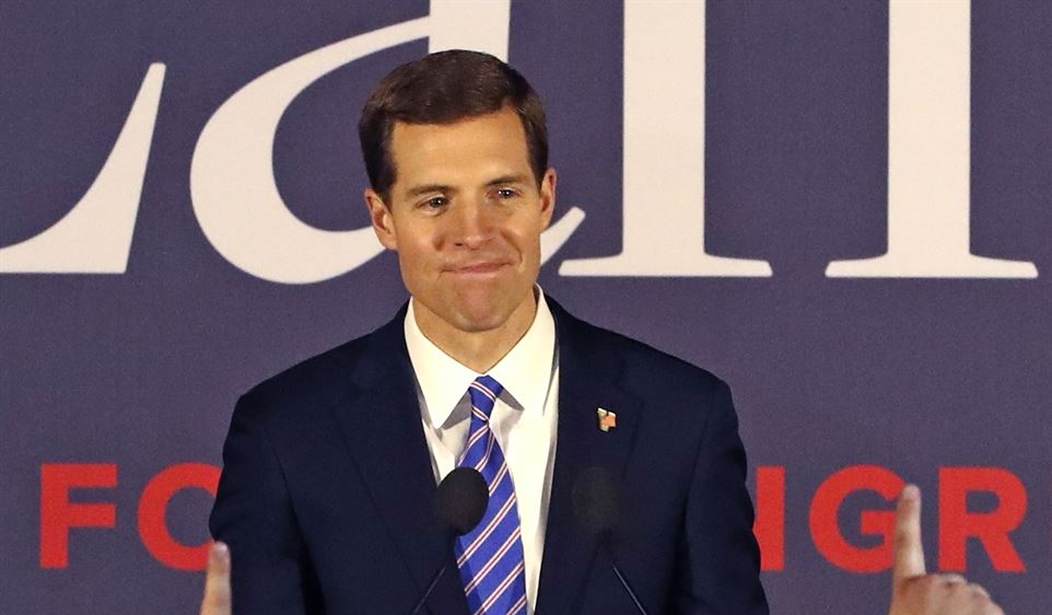What if they held a special election and nobody won? That's more or less what happened in southwestern Pennsylvania, in the special election to fill the vacancy in Pennsylvania's 18th Congressional District.
Democrat Conor Lamb narrowly defeated Republican Rick Saccone -- by 627 votes out of 228,378 counted -- in a district held by Republican Tim Murphy since 2003. More to the point, the district was carried by a 20-point margin by Republican Donald Trump in 2016 and by a 58-41 percent margin by Republican Mitt Romney in 2012.
Lamb's margin seems likely to hold up under a possible recount, but even if it doesn't, this result is a sign that the 241-194 majority House Republicans won in 2016 is likely to be overturned this fall.
The pattern of Lamb's narrow victory was similar to results in other special congressional and state legislative elections over the past year. Democratic turnout was robust, particularly in relatively upscale Pittsburgh suburbs. Republican turnout lagged, and some non-college-educated whites who voted for Trump and Romney voted Democratic this time.
Evidently, downscale whites, whose trend toward Republicans started in the 1990s and was augmented with the Trump candidacy, are less firmly attached to one party than Trump haters are to the other. This is in line with the skeptical response to any new policy change by either party, as evidenced by the negative responses to Obamacare when Barack Obama was in office and the negative response to Republicans' "repeal and replace" once Trump became president.
Recommended
Some observers argued that Saccone, like other Republican nominees in special elections, was a weak candidate. A better observation is that Lamb was a strong one. Nominated by party leaders, not in a primary, he has a family political pedigree (his uncle is Pittsburgh's city controller) in a long-settled metro area where such ties are important.
And he took moderate positions on multiple issues. A former Marine, he ran an ad showing him shooting an AR-15 and recently said that new gun laws aren't the answer to preventing more mass shootings at schools. Early on, he pledged not to vote for Nancy Pelosi for speaker (an issue that won't come up until at least January 2019). While many Democrats are baying for the impeachment of Trump, Lamb said, "We need the office of the presidency to succeed if we're going to make any progress on these issues."
Special elections are often good indicators for general elections, but they are also inherently low-stakes contests. You can vote for the opposition party without giving it immediate control. But in November, control of the House will be at stake.
Lamb's approach was similar to that of many candidates recruited by Rahm Emanuel in 2006, the most recent time Democrats overturned a Republican House majority. Their local roots and moderate positions were adapted to local terrain. That's something the minority party can do, while the majority party is usually stuck with the president's profile.
But it's not clear that Democrats have been as canny this year as Emanuel was a dozen years ago. They have some 1,200 candidates running for the 435 House seats, a great many of them full-throated Trump haters. And Democratic primary voters may resist party leaders' efforts to bolster moderate candidates. When the Democratic Congressional Campaign Committee urged voters in Texas' 7th Congressional District -- a target seat with many upscale voters -- not to vote for leftist Laura Moser, they responded by voting for her. Moser ran better on election day than in early voting and has a good chance to be nominated in the May 22 runoff.
The danger for Democrats is that they'll be seen as campaigning for impeachment, contrary to Pelosi's warnings, and as echoing the sentiments expressed by Hillary Clinton this week on her book promotion tour in India.
She characterized the areas voting for her as "optimistic, diverse, dynamic, moving forward," in contrast with the ones that had voted for Obama but spurned her. The latter are "looking backwards," she said. "You didn't like black people getting rights. You don't like women, you know, getting jobs. You don't want (to) see that Indian-Americans (are) succeeding more than you are." White female Trump voters, she went on, act under "ongoing pressure to vote the way that (their) husband, (their) boss, (their) son, whoever, believes (they) should."
Such virtue signaling appeals to those who still haven't accepted the outcome of the 2016 election. But it risks repelling voters in districts like Pennsylvania's 18th, who will determine which party controls the House in November's midterm elections.
























Join the conversation as a VIP Member